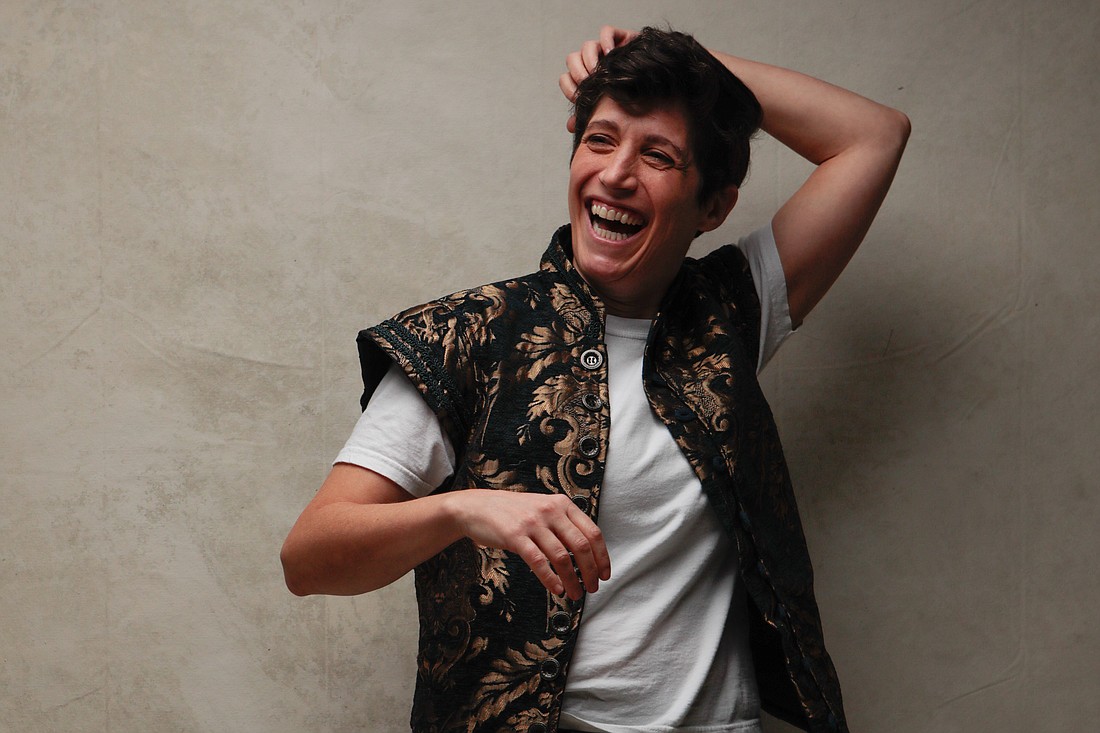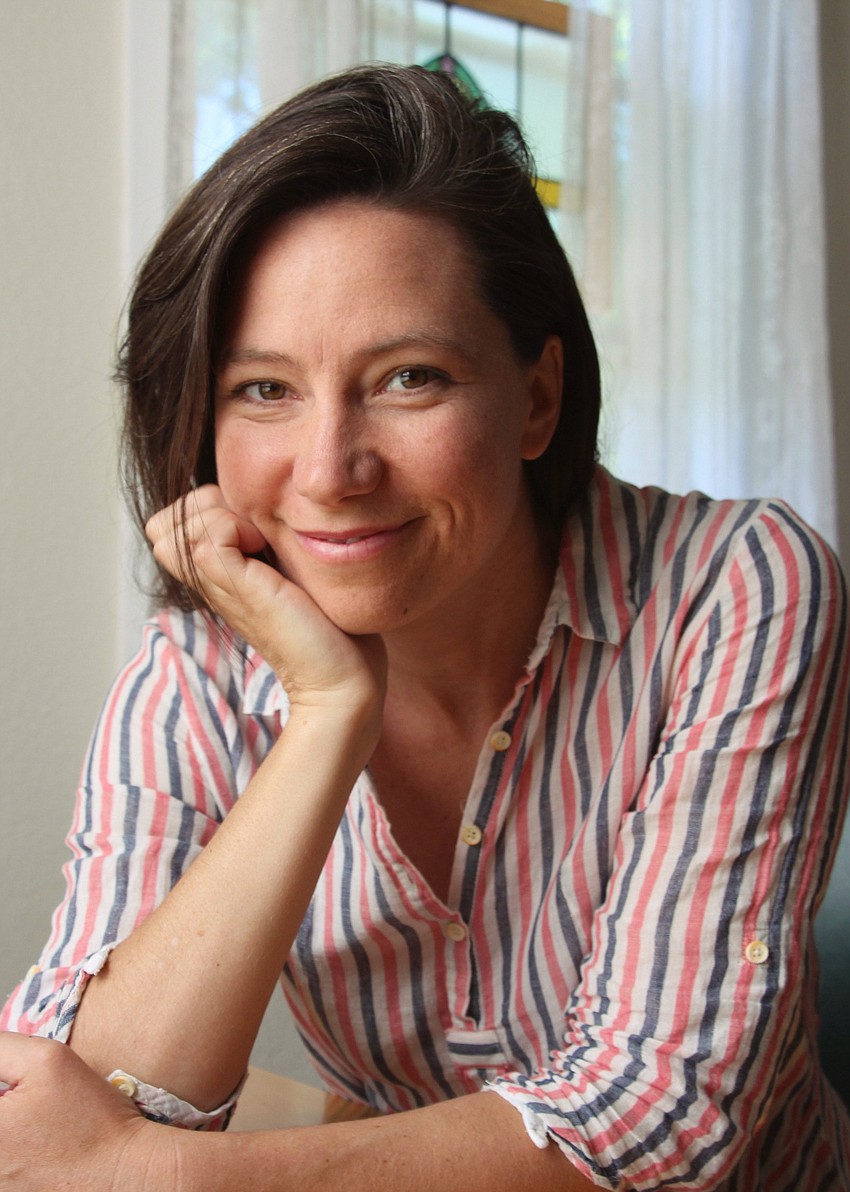- May 12, 2025
-
-
Loading

Loading

William Shakespeare is the most famous unknown in literary and theatrical history. We know the man’s words, but not the man.
Aside from the dull details of tombstones, wills and genealogy, the Bard’s a blank slate. Scribes and scholars love to fill in the blanks. (Shakespeare’s really Marlowe, or Bacon, or a time-traveling robot, or whatever. You name it, it’s been done.)
But playwright Katie Bender’s “Judith” sidesteps secondhand speculations. Her title character isn’t Shakespeare; she’s his sister. In her play, making its world premiere at Urbanite Theatre, Judith takes her brother’s place when he’s forced to skip town.
William’s in hiding; Judith’s in drag. Comedy ensues. But it’s character-based comedy, not a high-concept gimmick. Drag shtick about a chick with a paste-on beard would be a drag.
But Bender’s Judith is far more. Her character’s not just a woman in men’s clothing who writes hit plays. She’s large; she contains multitudes. Bender’s play reveals the many shades of Judith’s shape-shifting soul.
To thine own self be true. But which self are we talking about? With Judith, identity is a multiple-choice question. Here are some of the Bender's answers, revealed in a Q&A.
Thanks, but it was Livy Scanlon’s idea. She brought me the concept during the pandemic. So I have to give credit to Livy for the play’s story. And she’ll also be acting in the Urbanite premiere.
Yes. But Livy actually plays all the roles. “Judith” is a one-person play.
She plays four different characters with scenes. When she’s drifting in and out of different voices, that’s probably eight or nine more.
Livy’s her own person. She’s one of her kind — and very, very good.

That’s true. Livy is very good at switching between characters. I was an actor before I was a playwright. I struggled with vocal characterization in a solo show. What’s hard for me is easy for Livy. So I knew that Livy had those strengths. Giving her a chance to move in and out of different personalities was important me. And I knew it’d be fun for her!
Oh, absolutely. Livy’s having a blast jumping between different roles. These characters connect with deeply felt parts of herself — and they’re missing from most plays. Livy always wanted to play with different facets of her identity. Now she’s doing it! And she loves it.
In a personal sense, definitely. While Livy goes by “she” and “her,” she very much lives in a gay world. And there’s a whole spectrum of identity between “she” and “they.” And I think Livy wanted to play characters living in that bandwidth. What’s their experience? What do their lives look like? “Judith” lets her put those characters on stage. The title role definitely colors outside gender lines. Judith lived in the Elizabethan age; Livy’s a product of the modern age. But Livy’s deeply aware of how much they have in common. On a personal level, this play hits very close to home.
Let’s not.
Livy is also the artistic director of The Hanover Theatre Repertory in Hanover, Massachusetts. This was definitely a commission.
Yeah. All the shows I was working on suddenly stopped. It was quite a moment.
Livy and I were part of a Zoom writers group. We’d meet once a month. After Livy gave me the prompt, we started kicking the play’s concept around.
Exactly. So Livy would jump right in. She’d do scenes, or different versions of scenes; writers would make suggestions. Then the Zoom meeting would end. And I’d have to boil it all down.
That sounds depressing! (Laughs.) But my actual writing during this period came from a very playful place. I was reading Maggie O’Farrell’s “Hamnet,” and also reading Shakespeare, because I was adapting “Henry VI.” And I was simultaneously devouring Virginia Woolf. I kept asking myself: How could I brew up intoxicating language like that? How could I turn their worlds into my playground? That wasn’t a chore for me. That was a fun.
I think I completed it in 2021. Now it’s 2023, and “Judith” is going into its world premiere. It’s the shortest development process I’ve ever known in my entire life.
No, it wasn’t. I was tweaking “Judith” after every Zoom meeting. After that, we did two workshop productions in the real world. The first was at Hyde Park Theatre, here in Austin, Texas. I was there. Livy came down, too. But it’s a non-union company, so Livy couldn’t perform in it. So we both took our seats in the audience — and watched another actor up on stage. And after months of noodling the script, we finally got to see the play.
I guess we did. Livy had a few reservations with my first draft. But once she actually saw “Judith” performed on stage, she loved where I’d taken her original idea. On the way out, she said, “OK. This isn’t the play I asked for, but it can really live on stage. Now I get it.”
“Judith” differs in form from Livy’s vision, but I’d captured the substance. “How can you be your truest self in a world that doesn’t always value that self?” That’s the play’s central question. It’s perfect content for an actor who can switch beautifully between different versions of themselves. That was Livy’s original vision. That’s the play I wrote for her. “Judith” is an expression of who she is. I think she finally saw that.
That society imposes lots of cookie-cutter roles. Who are you? Gay, straight? He, she, it? Check the box. But you have to check one. But Judith is neither a “he,” a “she” or a “they.” Like the person who first dreamed her up, Judith plays around with different identities. But she doesn’t limit herself to any fixed definition of self. Or let society box her in to its rigid conventions.
Absolutely. If somebody wants to box you in, don’t let them. I think Judith had the right idea.